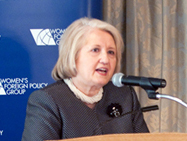CELEBRATING WOMEN LEADERS
 Washington, DC – On July 15, 2010, Ambassador-at-Large for Global Women's Issues Melanne Verveer addressed WFPG members and guests on the importance of women's leadership and women's empowerment for US foreign policy and the global economy. WFPG's Celebrating Women Leaders Luncheon was attended by representatives from embassies—including many of the women ambassadors—the government, corporations, international organizations, and NGOs. Judy Woodruff, Senior Correspondent for PBS NewsHour, moderated a question and answer session following Ambassador Verveer's remarks.
Washington, DC – On July 15, 2010, Ambassador-at-Large for Global Women's Issues Melanne Verveer addressed WFPG members and guests on the importance of women's leadership and women's empowerment for US foreign policy and the global economy. WFPG's Celebrating Women Leaders Luncheon was attended by representatives from embassies—including many of the women ambassadors—the government, corporations, international organizations, and NGOs. Judy Woodruff, Senior Correspondent for PBS NewsHour, moderated a question and answer session following Ambassador Verveer's remarks.
Ambassador Verveer spoke about the progress made since the Beijing World Conference on Women, and emphasized the "growing recognition that women's empowerment must be a central component of any effort to solve our most pressing global problems." These issues cannot be viewed solely as women's concerns, relegated to a place of lesser importance in the United States' foreign policy agenda. Ambassador Verveer explained that the creation of her position was part of an attempt to address this need by prioritizing women's voices and integrating them into the decision-making process at the State Department and throughout the government. The Ambassador also lauded the United Nations' creation of UN Women, noting that this agency will hopefully "really elevate [women's issues] in ways they have not been elevated and not been funded and not been supported as they ought to have been." She reaffirmed the widespread hope that the new head of UN Women will be someone of international acclaim with experience in management.
Ambassador Verveer emphasized the vital role women's leadership and women's empowerment play in the economic development of those countries still struggling with poverty. She noted that countries in which women enjoy relative equality with men generally boast higher levels of economic growth and competition, while countries with large gender gaps are more prone to violence and extremism. She went on to stress the importance of women's involvement in a country's peace process, both to ensure an enduring peace and to guarantee continued respect for women's rights. In Afghanistan and Pakistan, Ambassador Verveer praised those women "who are on the front lines, are fighting back, and taking back their religious values and their religion from those who define their religion as endorsing the oppression of women, or endorsing throwing girls out of school, or endorsing some of the worst kinds of violence." In describing how the United States can assist in empowering oppressed women, the Ambassador suggested that, "Women need to be made aware of their rights and education is absolutely critical, literacy programs are critical, and so is protecting them from violence."
The Ambassador also commented on the progress being made to combat international human trafficking, which she termed modern slavery. Despite the adoption by several countries of harsher punishments for traffickers, she noted that these laws fail to address the root of the problem. According to the Ambassador, "It is part of the very serious reality in the world and that's that women and girls are not valued, and if they are not valued ... they don't have the worth of what their human dignity should represent."
Ambassador Verveer closed her remarks with a call to action, citing Nicholas Kristof's observation that the 21st century's moral imperative must be women's equality. Echoing Secretary Clinton's famous words, the Ambassador firmly asserted, "We know that 'women's rights are human rights,' and we cannot settle for anything less."
View Benefit Luncheons Page